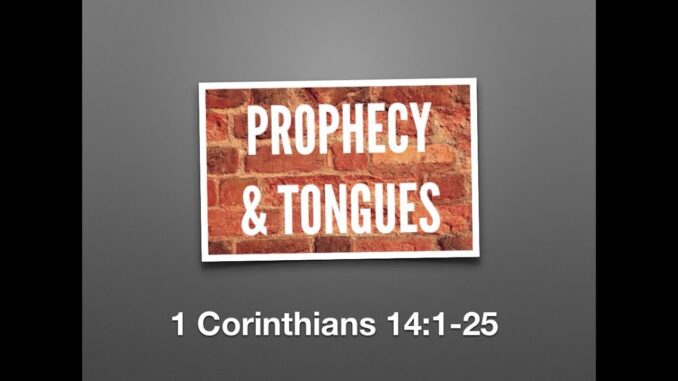
An Angelic Language Perspective

The gift of tongues, or glossolalia, is a profound and often debated spiritual gift in the New Testament. A compelling scriptural interpretation views tongues as a heavenly or angelic language—a spiritual form of communication used by angels and enabled by the Holy Spirit for believers.
This blog explores the “tongues of angels” as a literal heavenly language, drawing from 1 Corinthians 14 and Acts 2, and explains how the Holy Spirit enables hearers to understand this divine speech in their native tongues. It also clarifies Paul’s teaching on desiring tongues while emphasising prophecy, defines prophecy as exhortation and edification, highlights love as the motivation for these gifts, underscores God’s call to pursue spiritual gifts, and warns against the false teaching of cessationism while addressing distortions by the hyper-Pentecostal movement.
Tongues of Angels: A Heavenly Language
In 1 Corinthians 13:1, Paul writes, “If I speak in the tongues of men and of angels, but have not love, I am a noisy gong or a clanging cymbal.” The phrase “tongues of angels” suggests a spiritual language distinct from human dialects, used by angels—spiritual beings (Hebrews 1:14)—to communicate in God’s presence. Unlike human speech, angelic language transcends earthly limitations, reflecting the supernatural nature of the divine realm.
The gift of tongues, as described in 1 Corinthians 14:2, aligns with this angelic language: “For one who speaks in a tongue speaks not to men but to God; for no one understands him, but he utters mysteries in the Spirit.” When believers speak in tongues, they engage in a spiritual prayer language, communing directly with God in a way that mirrors the heavenly communication of angels.
Tongues as a Spiritual Prayer Language
Paul elaborates in 1 Corinthians 14:14–15: “For if I pray in a tongue, my spirit prays but my mind is unfruitful. What am I to do? I will pray with my spirit, but I will pray with my mind also.” Tongues are a form of prayer where the believer’s spirit, empowered by the Holy Spirit, connects with God, bypassing the intellect. This allows believers to “utter mysteries” to God (1 Cor. 14:2), akin to how angels worship in God’s presence. This heavenly language is directed to God, not men, distinguishing it from human languages used for earthly communication.
The Holy Spirit’s Role in Enabling Understanding
In Acts 2, the apostles, filled with the Holy Spirit, spoke in “other tongues” (Acts 2:4). The diverse crowd—Parthians, Medes, Elamites, and others—heard them “speaking in his own language” (Acts 2:6–11). This view holds that the apostles spoke in the tongues of angels, not human languages. The Holy Spirit enabled hearers to perceive this angelic speech in their native tongues, such as Parthian or Aramaic, making the gospel accessible. Those who mocked, saying, “They are filled with new wine” (Acts 2:13), heard only “babbling” because they lacked the Spirit’s enablement to understand. This miracle highlights tongues as a sign for unbelievers (1 Cor. 14:22), authenticating the gospel.
Paul’s Distinction: Tongues vs. Speaking to Men

Paul contrasts “speaking in tongues” with “speaking to men” in 1 Corinthians 14:2: “For one who speaks in a tongue speaks not to men but to God; for no one understands him.”
This suggests tongues are a spiritual language, unintelligible without divine intervention, aligning with the tongues of angels. In public worship, tongues require interpretation (1 Cor. 14:5, 13) to edify the church, as the Spirit translates the heavenly language into human speech, similar to Acts 2.
Prophecy: Exhortation and Edification, Not Predicting the Future

Prophecy, as Paul describes in 1 Corinthians 14:3, is speaking “to people for their upbuilding and encouragement and consolation.” Unlike the misconception that prophecy primarily involves predicting the future, New Testament prophecy focusses on exhorting and building up believers in their holy faith.
It involves Spirit-inspired messages that strengthen the church, encourage steadfastness, and comfort believers in their walk with God. Prophecy helps believers understand Scripture, including end-time prophecies (e.g., those in Daniel or Revelation), by providing clarity and application to God’s Word. For example, a prophetic word might illuminate how biblical truths apply to daily life or how end-time events call for faithfulness. This gift edifies the church by fostering spiritual growth and aligning believers with God’s purposes.
Paul’s Teaching: Tongues for All, Prophecy Emphasised

Paul values tongues, stating in 1 Corinthians 14:5, “Now I want you all to speak in tongues, but even more to prophesy.” He desires every believer to experience tongues for personal edification, as he himself does:
“I thank God that I speak in tongues more than all of you” (1 Cor. 14:18), likely in private prayer. However, he emphasises that believers should pursue prophecy even more, not instead of tongues, because it directly edifies the church through clear, Spirit-inspired exhortation (1 Cor. 14:3–4). He writes, “The one who prophesies is greater than the one who speaks in tongues, unless someone interprets” (1 Cor. 14:5), highlighting prophecy’s broader impact when tongues are uninterpreted. Paul encourages both gifts, urging believers to “earnestly desire the spiritual gifts, especially that you may prophesy” (1 Cor. 14:1) while not forbidding tongues (1 Cor. 14:39).
Love as the Motivation for Tongues and Prophecy

Paul frames spiritual gifts within the context of love, declaring in 1 Corinthians 13:1 that without love, speaking in tongues—whether of men or angels—is meaningless.
Love is the “more excellent way” (1 Cor. 12:31) that must motivate all gifts. Tongues, as a private prayer language, should flow from a heart of love for God, fostering intimacy with Him. In public, tongues with interpretation and prophecy should be exercised to build up the church in love (1 Cor. 14:4–5). Paul’s call to “pursue love” (1 Cor. 14:1) ensures that these gifts unify and edify, not divide or exalt individuals.
God’s Call to Pursue Spiritual Gifts

God directs His people to actively pursue spiritual gifts, as seen in Paul’s exhortation: “Pursue love, and earnestly desire the spiritual gifts, especially that you may prophesy” (1 Cor. 14:1).
This command reflects God’s desire for believers to seek the Holy Spirit’s empowerment, including tongues and prophecy, to strengthen their faith and the church. In 1 Corinthians 12:31, Paul urges believers to “earnestly desire the higher gifts,” indicating an active, prayerful pursuit of the Spirit’s manifestations. The gift of tongues, as an angelic language, and prophecy, as exhortation, are divine privileges available to believers, and God encourages us to seek them while prioritizing gifts like prophecy that edify others. This pursuit, grounded in love, aligns with God’s plan for a vibrant, Spirit-filled church.
Warning Against Cessationism’s False Teaching

Cessationism, the false teaching that spiritual gifts like tongues and prophecy ceased with the first apostles, is unbiblical and rooted in unbelief and the misuse of spiritual gifts, particularly by the hyper-Pentecostal movement.
Cessationism claims these gifts were only for the apostolic era to establish the church, but Scripture affirms their continuation until Christ’s return (1 Cor. 1:7: “You are not lacking in any gift, as you wait for the revealing of our Lord Jesus Christ”). The early Church was Pentecostal, marked by the outpouring of the Holy Spirit at Pentecost (Acts 2), with tongues, prophecy, and miracles as normative expressions of God’s power. This Pentecostal reality remains valid today, as the Spirit continues to empower believers (1 Cor. 12:11).
However, the hyper-Pentecostal movement has distorted biblical truth by promoting sensationalized practices, such as demanding tongues as a sign of salvation or fostering disorderly worship (contrary to 1 Cor. 14:33, 40). These excesses—often driven by emotionalism or self-exaltation—have led some believers to reject spiritual gifts entirely, “throwing the baby out with the bathwater.” True biblical Pentecostalism, like the early Church, emphasizes order, love, and edification (1 Cor. 14:26–40), with tongues and prophecy serving to build up the body under the Spirit’s guidance. Unlike the hyper-Pentecostal movement’s focus on spectacle, biblical Pentecostalism aligns with Scripture’s call for gifts to operate in love and unity. Cessationism’s denial of these gifts weakens the church by fostering unbelief and division, ignoring Paul’s command to “earnestly desire” gifts (1 Cor. 14:1) and “not forbid speaking in tongues” (1 Cor. 14:39). Believers must reject both cessationism and hyper-Pentecostal distortions, embracing the Spirit’s ongoing work in biblical balance.
The Purpose and Beauty of Tongues
The gift of tongues, as an angelic language, serves multiple purposes:
- Personal Edification: Tongues enable believers to pray in the Spirit, strengthening their faith (1 Cor. 14:4) in a manner akin to angelic worship.
- A Sign for Unbelievers: As in Acts 2, tongues authenticate the gospel when the Spirit enables understanding (1 Cor. 14:22).
- Public Edification with Interpretation: Interpreted tongues deliver messages to the church, functioning like prophecy (1 Cor. 14:5).
Conclusion
The gift of tongues, understood as the “tongues of angels,” is a heavenly language that allows believers to commune with God in a supernatural way. Rooted in 1 Corinthians 14 and Acts 2, tongues are distinct from human languages, with the Holy Spirit enabling hearers to understand them as native tongues. Prophecy, focused on exhortation and edification rather than predicting the future, helps believers understand Scripture and end-time prophecies, building them up in faith. Paul desires all believers to speak in tongues but emphasises prophecy even more for its clarity in edifying the church, not as a replacement for tongues. Love must motivate both gifts, ensuring they unify and edify. God calls believers to pursue spiritual gifts, rejecting false teachings like cessationism, which denies the Spirit’s work due to unbelief and hyper-Pentecostal distortions. True biblical Pentecostalism, unlike the hyper-Pentecostal movement, upholds the early Church’s Spirit-filled balance. This divine gift reflects angelic worship, offering believers a profound connection with God and the church when used in love and order.
Contact Us
If you have any questions or would like more information, please complete our Contact Form. Add the name of this blog to the comments, then add your message
